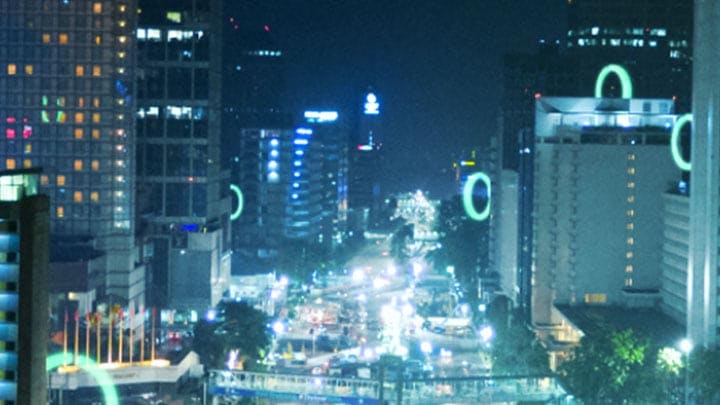11 April 2019
Thomas and Laura visit a training institute for marginalized youth, and see the electrifying effects education can have
Don Bosco Technical Institute in Delhi has the ambition is to teach youth 18-35, who are marginalized from the ‘new economy’ jobs, how to enhance their employability. Also, it wasn't far from our guesthouse. That was no accident though, as my girlfriend Laura and I have been keen to check it out for a while now.
So, on a sunny March day we set out to pay a visit. Although India sometimes feel quite foreign, getting to Don Bosco was just like I do it at home in Amsterdam: Uber.
The driver was there in 5min and 20min later he dropped us in front of a big old iron gate. We had arrived.
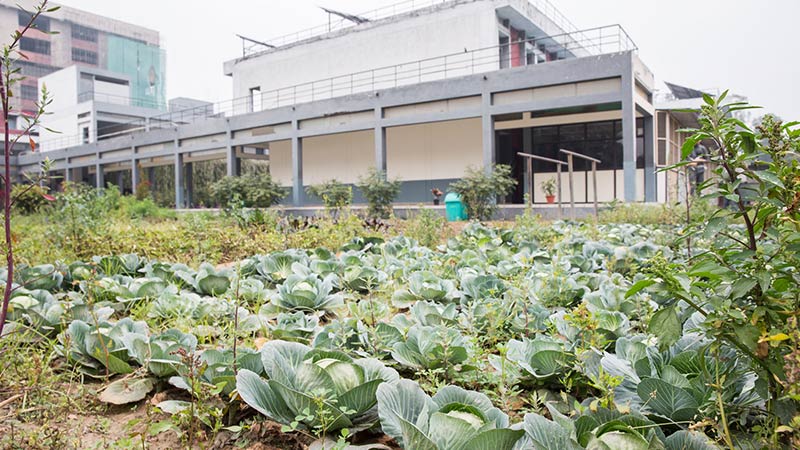
The first thing I noticed was how beautiful the garden is. It's kind of a roundabout with a perfect green pitch and plenty of colorful flowers. Later, we spoke with the gardener, who's been working here for 25 years and we complimented him on his amazing garden.
I also noticed a large and well-used looking soccer field.
As I was distracted, Hitesh, our contact person at Don Bosco, approached, snappily dressed in a brightly colored patterned suit.
Laura and I, expecting a less formal meeting, were dressed in T-shirts and jeans, and all of a sudden, we felt quite underdressed! Nonetheless, he welcomed us warmly and escorted us to the door of a classroom.
I immediately saw a big Philips poster and knew I was in the right place! This is just one stop on the journey my partner and I are taking a trip to do reportage of NGO initiatives in several different countries.
If you’d like to learn more about this project, I suggest reading this blog post which explains the Aasha Mission
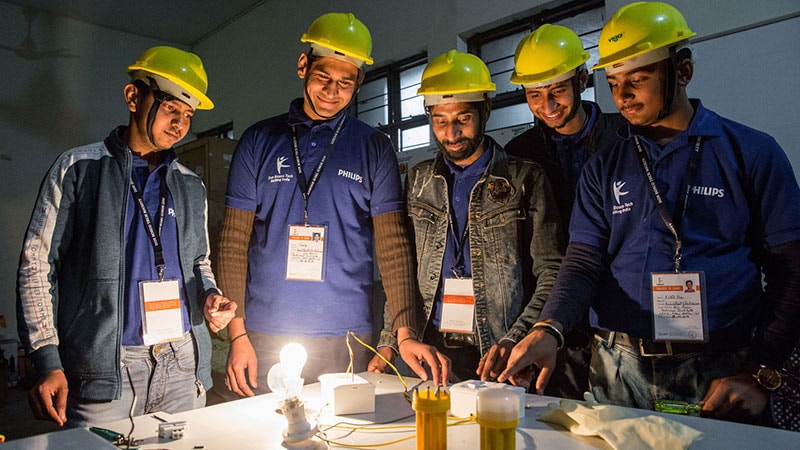
We were welcomed by 14 students between 20 and 36 years old, all wearing blue Philips jackets. We introduced ourselves and Laura explained that we wanted candid photos, so asked them to behave naturally.
Immediately everyone looked nervous: "how do I act natural!?!", they seemed to wonder. Laura told me later that this is something she encounters a lot. Luckily, class started and everyone settled in.
I sat at the back of the room to listen to the course which was half-English half-Hindi. It reminded me of my own electricity lessons. The teacher explained what electricity is, where it comes from, how it's transported, and I'm happy to say there was a strong emphasis on green energy and safety.
The principal has the ambition is to train 8,000 students a year, and he was proud to share the new work in progress: a seven-story building to host them all!
After an hour we left the class to meet the principal. He'd been leading the institute for 50 years, and his passionate eyes let us know just how strongly he felt about its purpose.
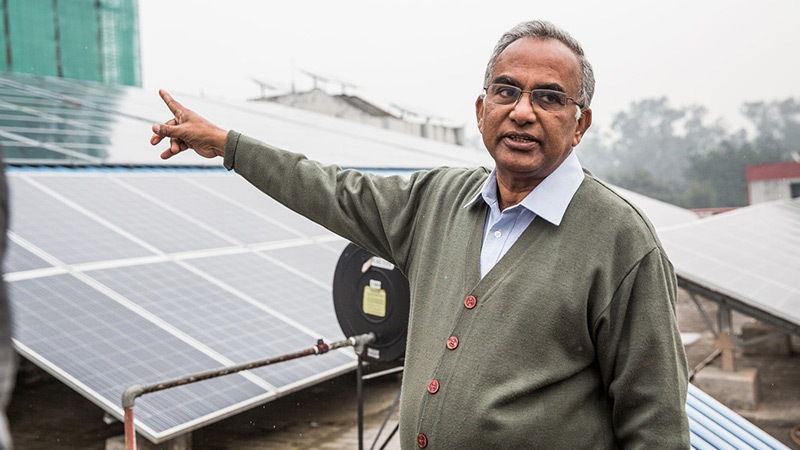
He gave us a tour and it was impressive to see the myriad programmes they propose: construction, electronics, mechanics, plumbing, power sector, printing – and more. His ambition is to train 8,000 students a year and he was proud to share the new work in progress: a seven-story building to host them all!
As we walked back through the courtyard, we saw students playing on the soccer field. They were laughing a lot, which was quite a change from the studious expressions and nerves of the morning's lesson. We ended up quite busy posing for selfies.
The teacher explained to me that they’re not used to seeing foreigners, and they'll all share the news of meeting us with their friends and family. We're not much different, since I'm doing the exact same thing right now.
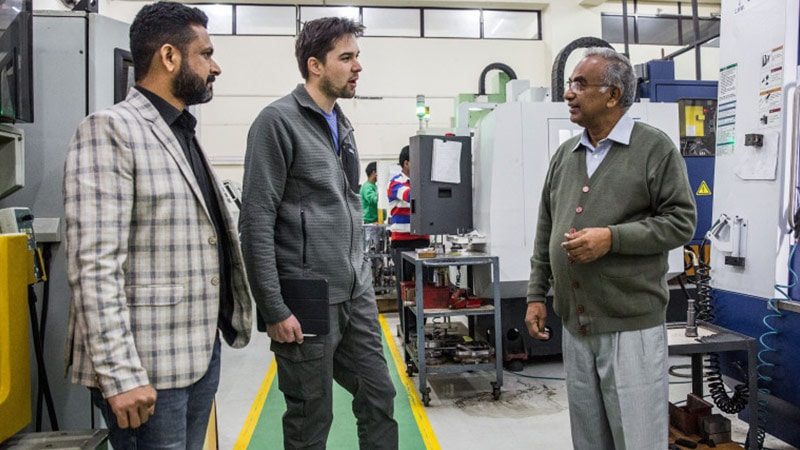
After lunch we went to the experimental classroom. Strangely (or perhaps fittingly!) the electricity of the room went down, so they had to fix it before the class. This was followed by another hands-on session where groups of students had to create serial and parallel electrical network including lamps and switches to explain the difference between those two options.
The atmosphere was more relaxed than in the morning, we could ask questions right and left and we had again some selfies. I used that opportunity to interview three students to get a better understanding of their stories. I felt again the stress in their voices but I quickly understood the challenge for them was actually to speak English.
Luckily Hitesh was here to translate and then they relaxed and spoke freely. Click here to read their stories.
To me the visit was a great moment; it helped me to understand how tough culturally, socially and economically it can be to come from rural villages or disadvantaged families.
Coming from Europe you easily forget how easy it is to access education – this thing that we take for granted others must work very hard for.
All photos: Laura Ponchel Photography
Signify (Euronext: LIGHT) is the world leader in lighting for professionals, consumers and the Internet of Things. Our Philips products, Interact systems and data-enabled services, deliver business value and transform life in homes, buildings and public spaces. In 2023, we had sales of EUR 6.7 billion, approximately 32,000 employees and a presence in over 70 countries. We unlock the extraordinary potential of light for brighter lives and a better world. We have been in the Dow Jones Sustainability World Index since our IPO for seven consecutive years and have achieved the EcoVadis Platinum rating for four consecutive years, placing Signify in the top one percent of companies assessed. News from Signify can be found in the Newsroom, on X, LinkedIn and Instagram. Information for investors is located on the Investor Relations page.
